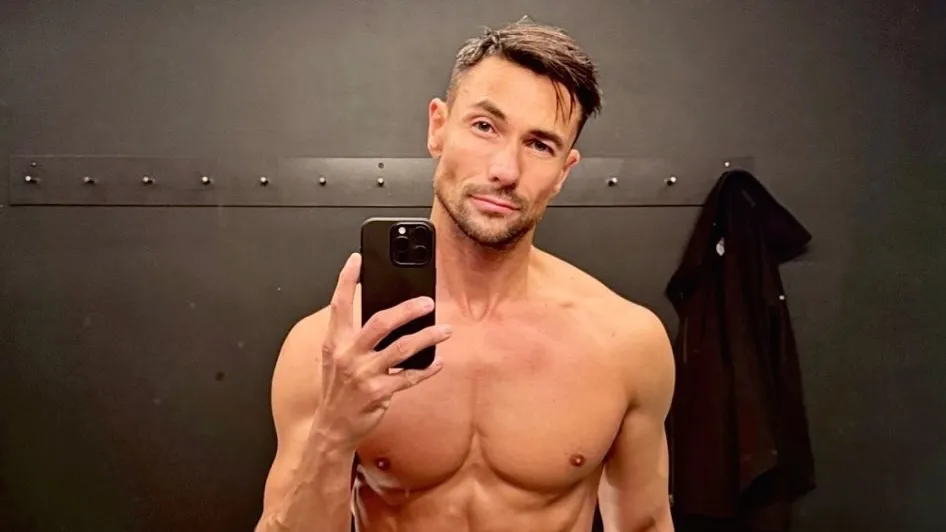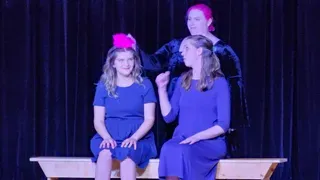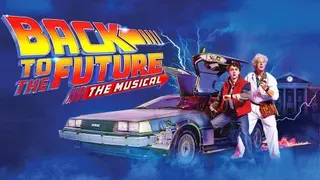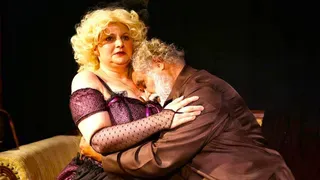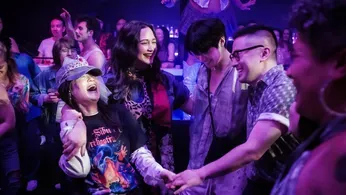
Apr 16
Review: Andrew Ahn Serves Up a Warmed-Over 'Wedding Banquet'
Kilian Melloy READ TIME: 4 MIN.
Remakes are inherently risky, and usually needless besides. If a movie caught the Zeitgeist, sparked the imagination, and became a classic, why would it need updating?
Sometimes it's because the times have progressed and a story told long ago could hold up well enough to tell it again, only in a fresher and more immediate way. This must have been what "Fire Island" director Andrew Ahn was thinking when he set out to remake Ang Lee's classic queer movie "The Wedding Banquet" from 1993, and the fact that James Schamus – the co-writer and producer of the original – was on board as co-writer and producer for the reimagined movie must have given Ahn confidence, as it would to anyone anticipating the new effort.
In a way, this might not really even be a remake so much as a story that's winkingly similar and crucially different from its three-decade-old antecedent. Instead of New York, we find ourselves in Seattle; instead of a cohabiting couple consisting of a Chinese businessman and his American boyfriend, with a Chinese tenant in need of a green card entering the picture to get the comedy rolling, we have a Korean artist named Min (Han Gi-Chan) in the country on a student visa who also happens to be the heir to a Korean clothing brand. There's his Ph.D. candidate Chinese-American boyfriend, Chris (Bowen Yang), and a lesbian couple who are both their best friends and landlords. (The guys live in a converted garage.)
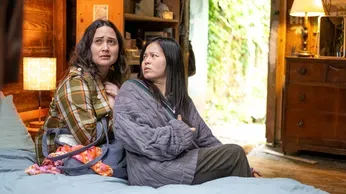
Source: Bleecker Street
In a very modern twist, the lesbian couple – Lee (Lily Gladstone) and Angela (Kelly Marie Tran) – are trying to have a child with the help of IVF. Two procedures have failed to "stick," and they can't afford a third attempt... until, that is, Min offers to pay for the procedure in exchange for Angela agreeing to marry him so that he can get a green card and not live under the threat of being dragged back to Korea by his strict grandparents, who are impatient for him to come home and assume leadership of the company.
This takes some twisty engineering on the part of screenwriters Ang and Schamus. Chris refuses to marry Min because he fears if he does, Min will be disinherited and lose his ties to his family – something that doesn't seem to bother Min much. Lee, older than Angela, is feeling increasingly desperate for a successful pregnancy, but Angela is never more than lukewarm on the idea of parenthood. Still, Chris is her best friend – ever since college and a one-time hookup – and she doesn't want to see him lose his man. She draws the line at carrying the IVF pregnancy herself, which ties into still more plot complications, but at root the driving conceit is the same as in the first film: A planned civil ceremony at City Hall isn't good enough for relatives abroad, who fly in to impose a culturally correct wedding celebration.
Schamus and Ahn depart from the original in making Min's grandmother (Oscar winner Youn Yuh-jung) far more clued in than the parents who barnstorm the couple in the 1993 "Wedding Banquet." Granny knows that Min is gay; she doesn't believe for a moment that he's in love with Angela, but once she hears the whole story she proves a willing accomplice, all to satisfy social expectations (and grandpa, back in Korea).
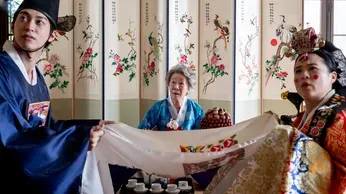
The actual wedding (and its banquet) play a much smaller role here, but certain other facets of the story remain intact, if hilariously recontextualized. A couple of key scenes from the Ang Lee film are re-created and riffed on here, and when Angela's mother (herself a source of dramatic conflict) suggests that they also celebrate a Chinese wedding, you can all but hear the movie pause for the expected guffaw.
But there's a slackness in this film, and a lack of the charm and electricity that the first movie possessed in quantity. Partly, this is because the pudding is over-egged and over-worked; a cousin called Kendall (Bobo Le) is introduced, then scarcely used, and it's unclear why the character is needed. The issues with her mother, and motherhood itself, that Angela struggles with feel tacked on to elevate the movie's amperage (and explain her reluctance), but that subplot adds little to the film overall.
There's also a certain incoherence to the film, which might come from a sense that it doesn't really know what it wants to do. Another danger of remakes is the inevitable comparison, and there's no avoiding it: The new film falls short of the original, which was so well-structured and organized that every beat advanced the story and added to the sum of its parts. This time around, that's regrettably not the case. Audiences are bound to leave this banquet unfulfilled.
"The Wedding Banquet" opens in theaters April 18.
Kilian Melloy serves as EDGE Media Network's Associate Arts Editor and Staff Contributor. His professional memberships include the National Lesbian & Gay Journalists Association, the Boston Online Film Critics Association, The Gay and Lesbian Entertainment Critics Association, and the Boston Theater Critics Association's Elliot Norton Awards Committee.
